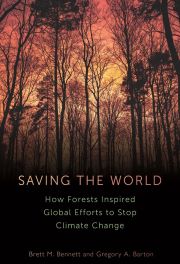Saving the World: How Forests Inspired Global Efforts to Stop Climate Change from 1770 to the Present

Brett M Bennett and Gregory A Barton
Reaktion Books, £18.00
This is a fascinating history of ‘climatic botany’: the relationship between forest and rainfall. The belief that forest and rainfall are closely connected has a long history, from Christopher Columbus stating that the luxuriant foliage of tropical islands was caused by the intense afternoon downpours, to controversial French spice trader Pierre Poivre arguing that the destruction of forest on the islands of Mauritius and Réunion had caused a dramatic decline in rainfall.
The book goes on to examine the lengthy dispute between Thomas Jefferson, who was convinced that the climate of the Americas was being improved by deforestation, and French naturalist Georges-Louis Leclerc, Comte de Buffon, showing that climate and deforestation were very much on the agenda at that time. A chapter is also devoted to polymath and founder of modern ecology Alexander von Humboldt, who asked Kew botanist Joseph Hooker to convince Lord Dalhousie to stop the deforestation causing climate change in India, with the resulting legislation protecting much of India’s forest.
Moving into the development of meteorological and climate research in the late 19th and early 20th centuries, the book leads to more modern times via discoveries in the Amazon rainforest using oxygen isotopes in the 1970s, which clearly demonstrated that large-scale atmospheric recycling of moisture occurs.
The authors state that there are many exciting reasons to believe that modern science now holds the key to better managing our forest and water resources for the good of humans and nature. It’s clear that to succeed we need to learn both from history and from contemporary science. The title, Saving the World, indicates this is a book that calls for using information for action to save both our forest and climate. The case for this is most thoroughly researched here, making it an important read for anyone interested in climate change and climate botany.
Sir Ghillean Prance FRS FRSB
Reviewed by Sir Ghillean Prance FRS FRSB, botanist, ecologist and former director of the Royal Botanic Gardens, Kew


